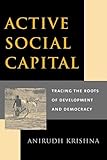Active Social Capital : Tracing the Roots of Development and Democracy / Anirudh Krishna.
Material type: TextPublisher: New York, NY : Columbia University Press, [2002]Copyright date: ©2002Description: 1 online resource (192 p.)Content type:
TextPublisher: New York, NY : Columbia University Press, [2002]Copyright date: ©2002Description: 1 online resource (192 p.)Content type: - 9780231500821
- 9780231500821
- 302 306.3
- HM708 .K75 2005
- online - DeGruyter
- Issued also in print.
| Item type | Current library | Call number | URL | Status | Notes | Barcode | |
|---|---|---|---|---|---|---|---|
 eBook
eBook
|
Biblioteca "Angelicum" Pont. Univ. S.Tommaso d'Aquino Nuvola online | online - DeGruyter (Browse shelf(Opens below)) | Online access | Not for loan (Accesso limitato) | Accesso per gli utenti autorizzati / Access for authorized users | (dgr)9780231500821 |
Browsing Biblioteca "Angelicum" Pont. Univ. S.Tommaso d'Aquino shelves, Shelving location: Nuvola online Close shelf browser (Hides shelf browser)

|

|

|

|

|

|

|
||
| online - DeGruyter Just Living : Poems and Prose of the Japanese Monk Tonna / | online - DeGruyter Special Effects : Still in Search of Wonder / | online - DeGruyter Love to Hate : America's Obsession with Hatred and Violence / | online - DeGruyter Active Social Capital : Tracing the Roots of Development and Democracy / | online - DeGruyter In Another Country : Colonialism, Culture, and the English Novel in India / | online - DeGruyter Randall Jarrell and His Age / | online - DeGruyter The Sound of the Kiss, or The Story That Must Never Be Told / |
Frontmatter -- Contents -- Preface -- 1. Introduction: Can Social Capital Help Support Development and Democracy? -- 2. How Might Social Capital Matter? -- 3. Structure and Agency: New Political Entrepreneurs and the Rise of Village-Based Collective Action -- 4. Measuring Social Capital -- 5. Understanding Economic Development: Why Do Some Villages Develop Faster than Others? -- 6. Examining Community Harmony: Why Are Some Villages Peaceful and Others Not? -- 7. Democratic Participation in Rural North India: Social Capital and New Political Entrepreneurs -- 8. Conclusion -- Appendix A: Methodology -- Appendix B: Details of 60 Villages in Rajasthan -- Appendix C: Map of Village Balesariya -- Notes -- References -- Index
restricted access online access with authorization star
http://purl.org/coar/access_right/c_16ec
The idea of social capital allows scholars to assess the quality of relationships among people within a particular community and show how that quality affects the ability to achieve shared goals. With evidence collected from sixty-nine villages in India, Krishna investigates what social capital is, how it operates in practice, and what results it can be expected to produce. Does social capital provide a viable means for advancing economic development, promoting ethnic peace, and strengthening democratic governance? The world is richer than ever before, but more than a fifth of its people are poor and miserable. Civil wars and ethnic strife continue to mar prospects for peace. Democracy is in place in most countries, but large numbers of citizens do not benefit from it. How can development, peace and democracy become more fruitful for the ordinary citizen? This book shows how social capital is a crucial dimension of any solution to these problems.
Issued also in print.
Mode of access: Internet via World Wide Web.
In English.
Description based on online resource; title from PDF title page (publisher's Web site, viewed 02. Mrz 2022)


